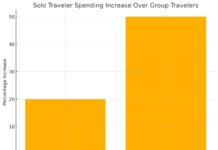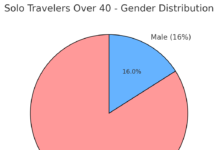
The future of AI in the travel industry is a topic that has been attracting a lot of attention and interest in recent years. AI, or artificial intelligence, is the ability of machines or software to perform tasks that normally require human intelligence, such as understanding language, recognizing images, learning from data, and making decisions. AI can be applied to various aspects of travel and tourism, such as planning, booking, customer service, marketing, operations, and management. In this article, we will explore some of the benefits and challenges of AI in the travel industry, and provide some examples of how AI is transforming the industry.
Benefits of AI in the Travel Industry
AI can offer many benefits to both travelers and travel providers, such as:
- Personalization: AI can analyze huge amounts of data, such as previous bookings, search history, social media activity, and customer feedback, to generate valuable insights that can enhance the customer experience and satisfaction. AI can create personalized recommendations, offers, and services for each customer, based on their preferences, interests, needs, and behavior. For example, Expedia uses AI to create dynamic packages that combine flights, hotels, car rentals, and activities that suit each customer’s budget and preferences1.
- Automation: AI can automate and streamline many tasks and processes that are repetitive, time-consuming, or error-prone. AI can handle customer inquiries, requests, and complaints through chatbots or voice assistants that can understand natural language and provide instant and accurate responses. For example, KLM uses an AI-powered chatbot called BlueBot (BB) that can help customers book flights, check-in, change seats, or get flight information through Facebook Messenger or WhatsApp2. AI can also automate back-end operations such as inventory management, pricing optimization, fraud detection, or revenue forecasting.
- Innovation: AI can enable new and innovative products and services that can create new value propositions and competitive advantages for travel providers. AI can generate creative content such as images, videos, or texts that can attract and engage customers. For example, Contiki uses an AI tool called ChatGPT to create travel itineraries based on natural language prompts from customers3. AI can also create immersive experiences such as virtual reality (VR) or augmented reality (AR) that can enhance the travel journey. For example, Marriott uses VR to allow customers to explore different destinations and hotels before booking1.
Challenges of AI in the Travel Industry
AI also poses some challenges and risks that need to be addressed by travel providers, such as:
- Data quality and security: AI relies on large amounts of data to function effectively and efficiently. However, data quality and security are crucial issues that need to be ensured by travel providers. Data quality refers to the accuracy, completeness, consistency, and relevance of the data that is used by AI systems. Poor data quality can lead to inaccurate or misleading results that can harm the customer experience or the business performance. Data security refers to the protection of the data from unauthorized access, use, modification, or disclosure. Data breaches can compromise the privacy and safety of the customers and the reputation and credibility of the travel providers.
- Ethical and social implications: AI also raises some ethical and social questions that need to be considered by travel providers. Ethical implications refer to the moral principles and values that guide the design, development, deployment, and use of AI systems. Some of the ethical issues include fairness, transparency, accountability, privacy, human dignity, and human rights. Social implications refer to the impact of AI on society and human interactions. Some of the social issues include employment, education, culture, diversity, and inclusion.
How to Succeed with AI in Travel Industry
AI is poised to be a game-changer for the travel industry. However, to succeed with AI in travel industry, travel providers need to adopt a strategic approach that considers the following factors:
- Business objectives: Travel providers need to define clear and specific business objectives that they want to achieve with AI. These objectives should be aligned with their vision, mission, values, and goals. They should also be measurable, achievable, relevant, and time-bound.
- Customer needs: Travel providers need to understand their customers’ needs, expectations, and preferences. They need to conduct market research, customer segmentation, and persona development to identify their target segments and their pain points and opportunities. They also need to collect and analyze customer feedback to measure customer satisfaction and loyalty.
- Technology capabilities: Travel providers need to assess their current technology capabilities and gaps in terms of infrastructure, platforms, tools, data, architecture, and governance. They need to invest in upgrading or acquiring the necessary technology resources that can support their AI initiatives. They also need to partner with technology vendors or experts that can provide them with the best solutions and services.
- Organizational culture: Travel providers need to foster an organizational culture that embraces innovation, collaboration, and learning. They need to involve and empower their employees at all levels in their AI projects. They need to provide them with the appropriate training, education, and incentives to develop their AI skills and competencies. They also need to communicate and share their AI vision, strategy, and results with their internal and external stakeholders.
AI in travel industry is a topic that has been attracting a lot of attention and interest in recent years. AI can offer many benefits to both travelers and travel providers, such as personalization, automation, and innovation. However, AI also poses some challenges and risks that need to be addressed by travel providers, such as data quality and security, ethical and social implications, and business objectives. We hope this article has been helpful for you. If you have any questions or requests related to AI in travel industry or anything else, please feel free to ask us. We are always happy to chat with you



























